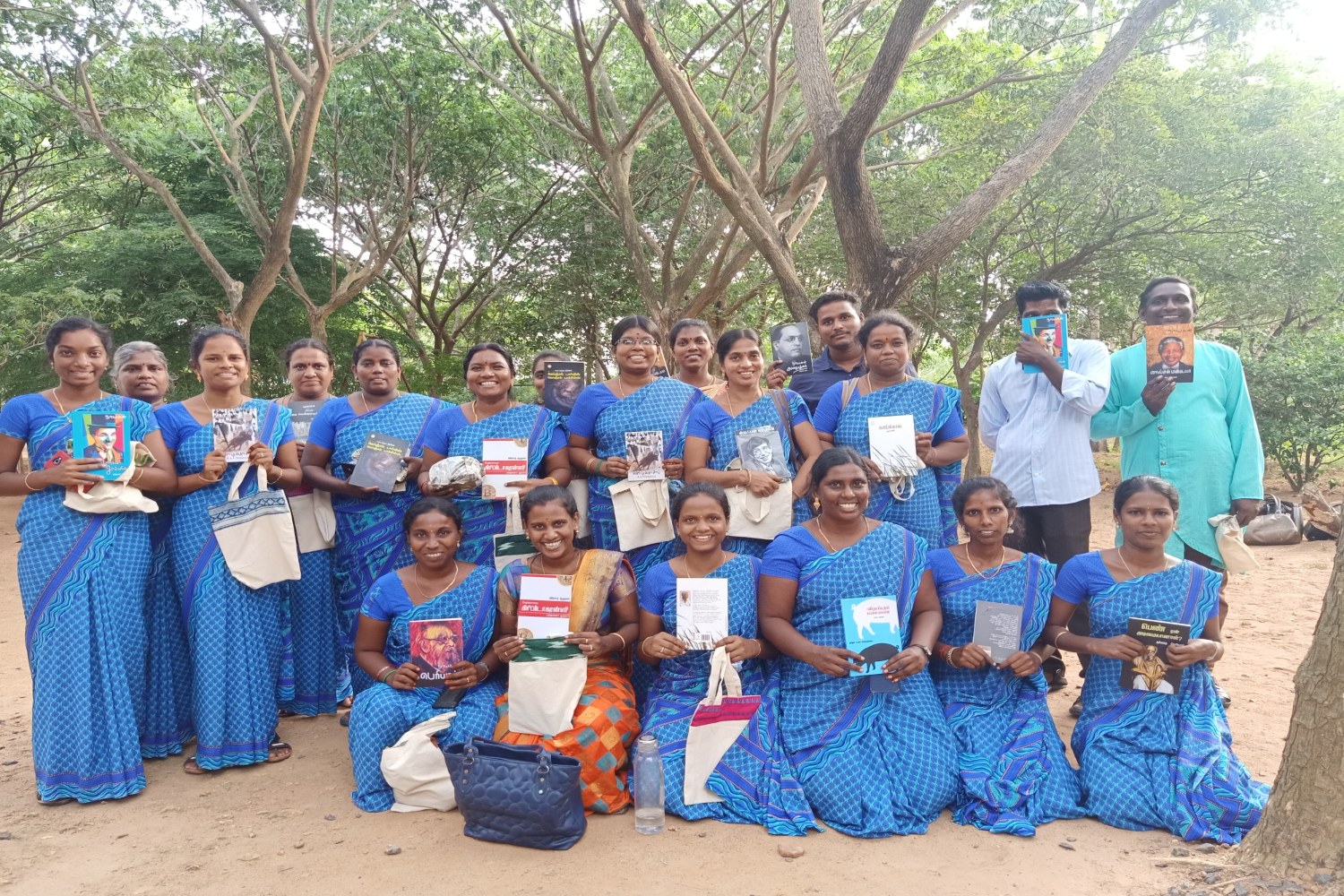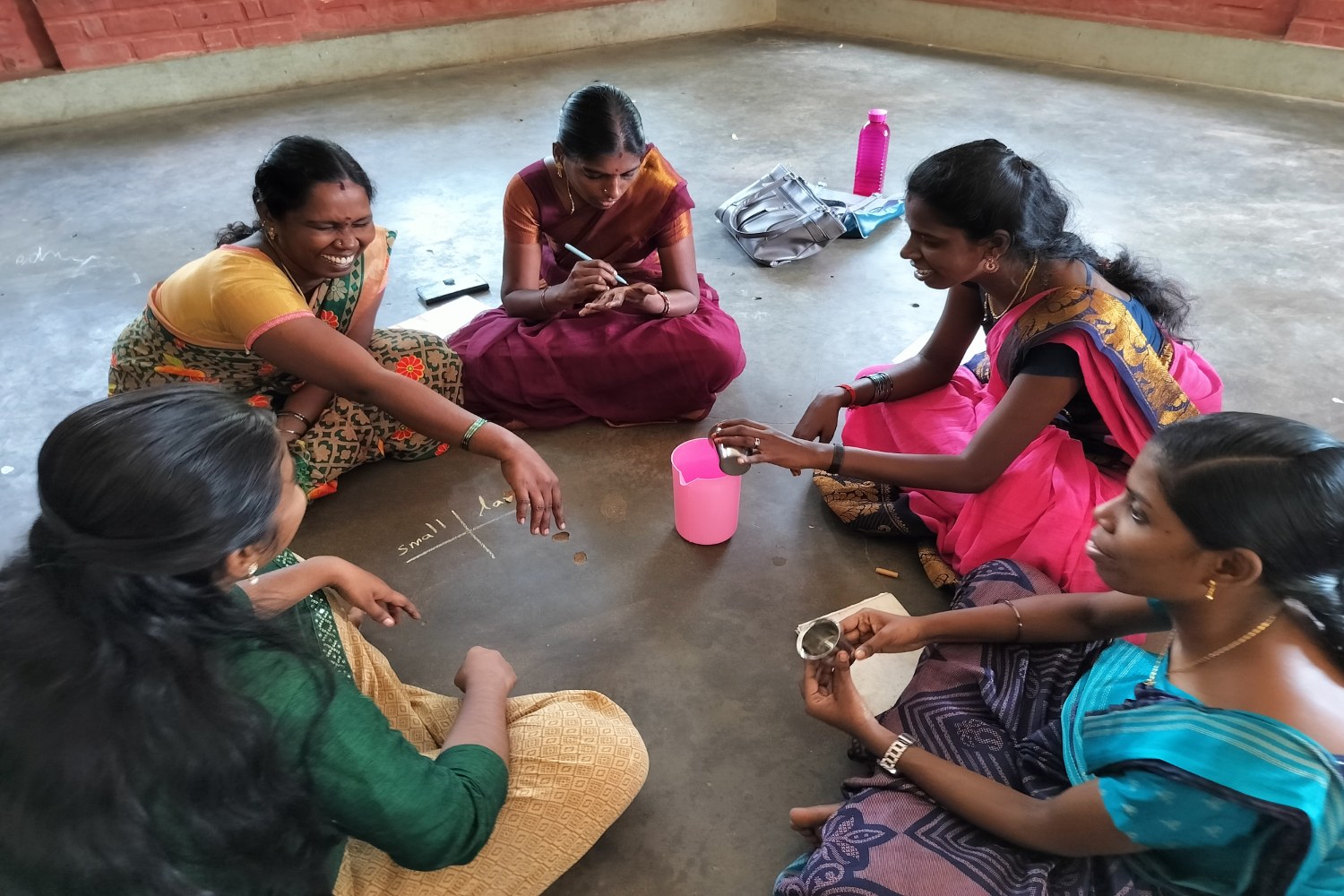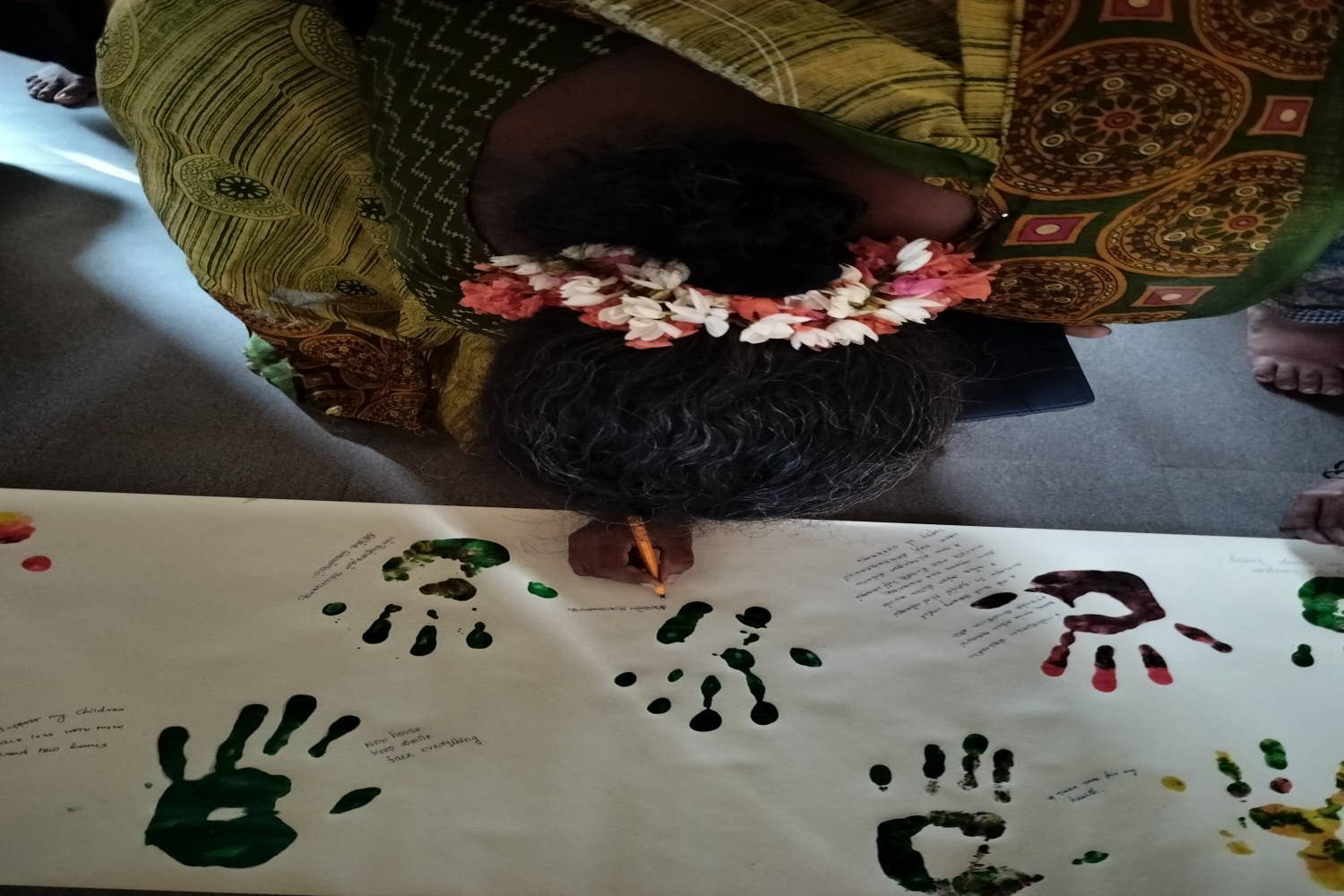Our journey toward collective growth – Reflections from building strong connects with our teacher community
In her essay titled “Our journey toward collective growth,” Nisha Subramaniam reflects on how the process of capacity building for the teachers her organization works with, has been built on the foundation of the deep relationships sustained over the years with the teacher community.

Summer of 2017. A group of teachers enter a large hall. The blackboard has a clear agenda written out. The facilitator starts the session with a question and is met with deep silence. The facilitator tries to joke, “Am I audible?” and doesn’t even get a laugh. The day progresses, as silently as it started. Lunch is announced and teachers eat in their school teams. The rest of the afternoon is stifling hot, grows further quiet, and the day ends earlier than planned.
Cut to 2024. Teachers walk in armed with teaching resources and planning books. There is music playing as teachers walk in, and there is a welcome committee giving high-fives to teachers. The opening activity has over fifty percent of hands shooting up to respond. The day progresses with teachers engaging in sessions in smaller groups to engage in different aspects of their role.
Teachers sit in grade-level groups and share their classroom report cards. Their reflections summarize the term gone by. These highlight the wins of their journeys with students, some data-points on the number of students who have grown along the parameters they have focused on, a few challenges that have been tiring. Teachers in the circle share their appreciation, and ideas for what can make the challenges easier, and take inspiration from each other.
Post lunch, there is a resource mela. Teachers demonstrate various teaching and learning materials and activities. School leaders sit in different teacher groups listening to their team and their reflections. Teachers write a letter to their students ten years from today. They reflect on what they wish to see for their students a decade from now. The letter reflects hope and power, a confidence that teachers have, in their dreams for their children. The day ends with a big happy group photo, teachers exchanging last-minute requests, promises to share resources, and goodbyes.

Understanding our teachers
What we see in 2024, amidst the 50+ teachers we work with, in our 7th year of work here, is the closest we have been to creating spaces that positively enable teachers’ CPD. The core of our work involves thinking about teachers, their role, and their development.
So, we often ask ourselves, who are our teachers? What is their experience of the work? When we begin to explore this question, several complexities surface.
She is the teacher whose “work” typically begins 4-5 hours before she is in school. The one who comes into school after wrapping up unpaid work at home, spends 6-7 hours in school shuttling between academics and administrative duties. She may most likely be taking on additional duties at school and may not be teaching subjects or grades she is most familiar with.
She spends time slowly figuring out data entry for the day, while her students wrap up writing work she has set up for them. A hurried lunch, and some more hours of teaching later, she rushes home. Evening tuitions begin – a little support system for an additional income to make ends meet, while meaningfully spending her evening. She is then greeted by unpaid domestic work, and her own children’s educational needs, homework, and learning time. Soon, it is time for her to choose between completing corrections from the day or planning for the next day or getting to bed on time.
Weekends are a rinse and repeat of this, with an added load of domestic chores, working Saturdays or training days at school. Of course, amidst all this, she is the one who is planning for the annual day, sports day and school showcases, identifying struggling students and working with them after school hours (before her tuition), preparing mark sheets and report cards, attending to election or exam duties and will be the first person to step forward, in case a child’s safety is compromised. As we understand our teachers, we have realized that building a collective narrative of our people becomes essential, if we wish to contribute to their professional development.
All our teachers come from the same villages as our children. They have studied in local government schools in Tamil medium. They have broken several social barriers to complete multiple degrees. All our teachers have completed formal professional education – D.T. Ed. or B. Ed., after which they have fought societal pressures and stepped out of their homes to work. At the first instance of a family member being unwell, or a possibility of marriage, families push women to stop working.
High attrition rates lead to instability in school systems. This puts pressure on the teachers to constantly do “more than their bit.” As we got to know our teachers, it became evident that we have to understand them as whole people, support them in their journeys as women, mothers and primary caregivers, and as professionals who need support to excel in their job. Building awareness of “Who am I, what is my world and how does this play a role in my classroom,” has been a constant theme of exploration with our teacher teams.
The other powerful realization, has been that CPD is not one path that we take every teacher on. Everyone has their own curve and path on this journey. Teaching is expected to be a transformative experience. Hence, CPD also demands to be transformative for each individual. It must be designed in a way to put everyone on their own learning paths.
Our vision for CPD
Our vision for our team of teachers is that we evolve into reflective leaders who will practice a growth mindset, learn and grow with the ecosystem, and reflect continuously toward the development of self and the students. Our team of teachers create safe and joyful learning environments for children, where rigorous learning and engagement is enabled. Our work spans four affordable private schools, 55 teachers working from KG to 10th standard. As we work with affordable private schools, the biggest challenge this sector faces is teacher attrition. Hence teacher development is an ongoing, continuous effort. Here we aim to support a group of teachers who have varying experiences.
Toward this vision, we have been working on building professional and personal leadership in each teacher. A big learning for our team over the years has been that while “the what” of teacher development will keep changing based on the system, the grades they teach, the context of the school, designing an effective, meaningful, and holistic “the how” of teacher development is critical.
Over the years, there has been an evolution in our approach, beliefs, systems, structures, and formats. This has been possible with active participation from all the teachers who have proactively contributed to shaping the how. School leaders play a very crucial role in nurturing a culture of risk-taking, participation, and agency in their teams. This has enabled teachers to participate at a cluster level of four schools.
A core aspect of enabling continuous professional development in all teachers is for them to have the agency to engage, design, and shape their path. On the path to making this happen, our chosen pathways include building awareness in them as individuals. We have tried to facilitate nurturance of a collective identity and belongingness with the teacher community. We have also tried providing contextual support through training, resources, and in school support.
So, what wins have we collected?
What is a win when it comes to building a team of teachers in a rural setting? Does a teacher negotiating with her family to schedule her wedding in May during school vacation tell her she is growing? Does a teacher volunteering to travel to another school to observe and learn, demonstrate her professional development? How about a teacher conducting training for new teachers in their school and leading teacher circles at cluster-level? How about generating 200 written pieces from teachers across key social themes over the course of a month when we focused on self-expression?
The numerous stories of teachers demonstrating their growth, learning and leadership are a big motivator for our team. As we dig into the chosen pathways, we see that each of those efforts contributes to these stories that we consider as our wins. Building awareness in teachers through conversations, books, and circle time, with different speakers on themes of feminism, equality, and breaking barriers, we believe has contributed to the teacher, a 26-yearold woman from a coastal rural village, negotiating with her family to make things possible for her students.
Every month, teachers come together and meet in grade-level and subject groups, where they share their challenges, learnings, wins and experiments. These spaces make teachers feel most understood, as all our teachers teach unique grades and subjects in our schools. Therefore, meeting another grade three teacher creates a sense of belonging in a very different way. Such spaces have led to teachers knowing the successes and stories of another teacher. Therefore, they have begun to see them as a person in their ecosystem who can support them with their growth.
To sustain these communities, sharing, online communities have been leveraged. Teachers share lesson plan ideas, student work, resources and reflections with each other through their WhatsApp group. Lastly, inviting teachers to create an agenda for training new teachers, co-leading sessions, and creating resources, has enabled them to play an active role in enabling the development of teachers in the cluster.

The “What’s that matter”
Over the years, what is critical for teachers to engage with in terms of their learning and development has varied. It has grown from focusing mainly on pedagogy, which involve general pedagogical skills that can be applied by teachers across subject domains, to understanding policy, its implications in the present and future. Working with a diverse group of teachers across kindergarten, primary, secondary, and co-curricular domains has enabled us to recognize some key pillars of CPD for our teachers. These have also been influenced by theoretical frameworks such as Shulman’s PCK (Pedagogical Content Knowledge), NCFTE (National Curricular Framework for Teacher Education) and various other alternate schools of thought.
Currently, we see the following as pillars of our CPD for our teachers – general pedagogical knowledge and skills, pedagogical content knowledge, content and curricular knowledge, understanding of learners and learning, personal leadership, educational aims and purpose, and lastly, technology enabled learning. We work with our team of teachers across these seven domains.
We believe this enables their development as a professional with agency. Working with these domains has also helped us understand that development across these domains is a very subjective journey for different teachers. It is very challenging to pick just one domain or sub-domain as the focus for an entire school or a grade level. Therefore, enabling teachers to understand these pillars, and identifying their strengths and skills to be developed through reflective conversations, have been our focus areas over the last couple of years.
We have done discussions from books, gifted a select set of books for Teachers Day, and encouraged teachers to borrow and read from each other, invited a range of speakers, and conducted sessions on content domains, NEP (National Education Policy), NCF (National Curriculum Framework), and development theories. Some of the opportunities are created for all teachers, while some are choice-based. Engaging with these themes over a period of time, and bringing these back every once in while, have allowed for ideas to simmer, aided reflections, and enabled deeper learnings.
Miles to go
Despite several years of working with a small set of 50 teachers, the language barrier feels like an unsurmountable one. The English language acts as a gatekeeper for many opportunities. It has been a rather tough road in supporting our teachers to break this barrier. Working in an affordable private school, the poor pay that the system offers, social barriers and limitations of infrastructure such as public transportation, permissions from families to participate in opportunities, still largely determine the scope and possibilities of enabling CPD for teachers.
While in-person spaces create meaningful collaboration, online communities have their limitations. Sometimes it creates pressure to share when the teacher might not find it meaningful, there is more sharing of the “correct” responses as opposed to reflective sharing of what has emerged in their classrooms. Debriefs on how these WhatsApp communities can be leveraged by discussing possibilities, facilitators proactively sharing examples with mistakes in them, and sharing reflections, have helped in making these groups more candid and reflective. Teachers do not find sufficient time for their own development across content, pedagogy or learning. This is a huge limitation in a financially constrained set up like an affordable private school in the rural setting.
Being first ever graduates in their families, mostly the few in the village, there is immense hope placed on them to do well for themselves. Especially as a teacher, there is immense pressure to do the right thing, at all times. This pushes teachers to feel defensive about new ways of thinking and working. A feeling that their methodologies are in question, comes in the way of self-development.
As much as we celebrate what has moved forward, we also share and pause at what has not. We often ask our teachers, what they recommend as solutions. Many wonderful ideas around modalities of training, how we follow up, what the content is, have emerged from these spaces. As we see what is ahead of us, we see different materials and tools available for us, to collectively come and build a path with our teachers. It makes the most sense, for us to traverse what we build, and build together, what we can all traverse.

No approved comments yet. Be the first to comment!